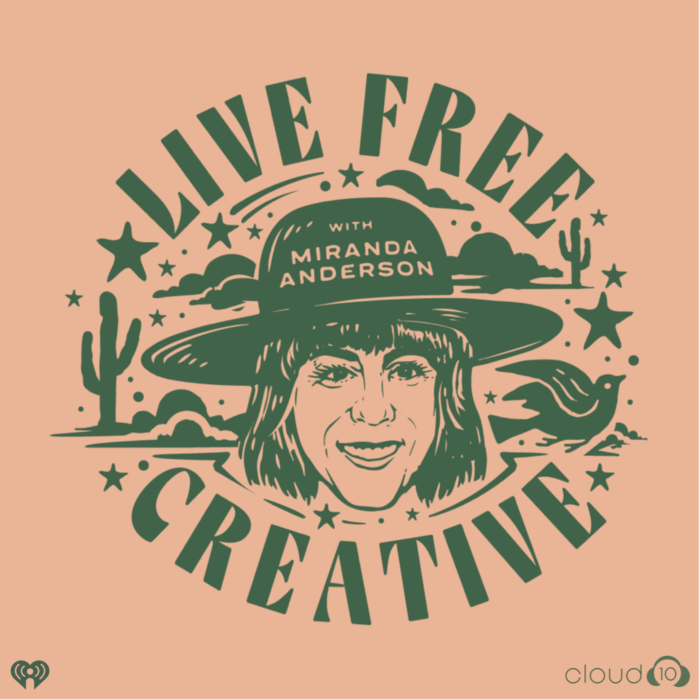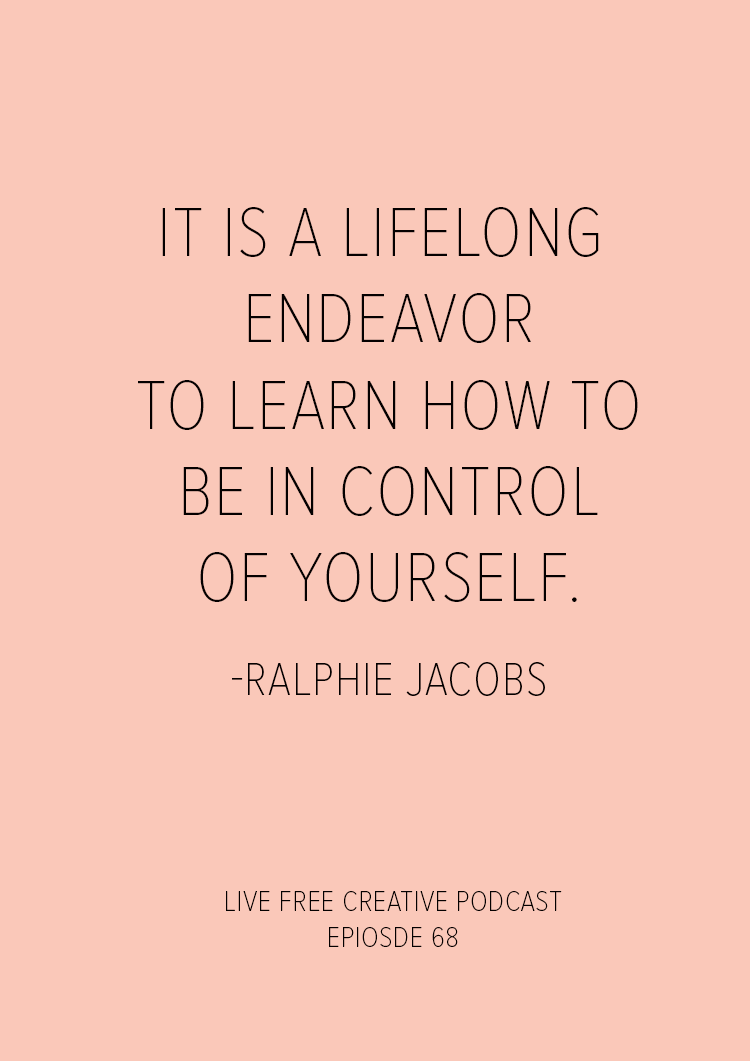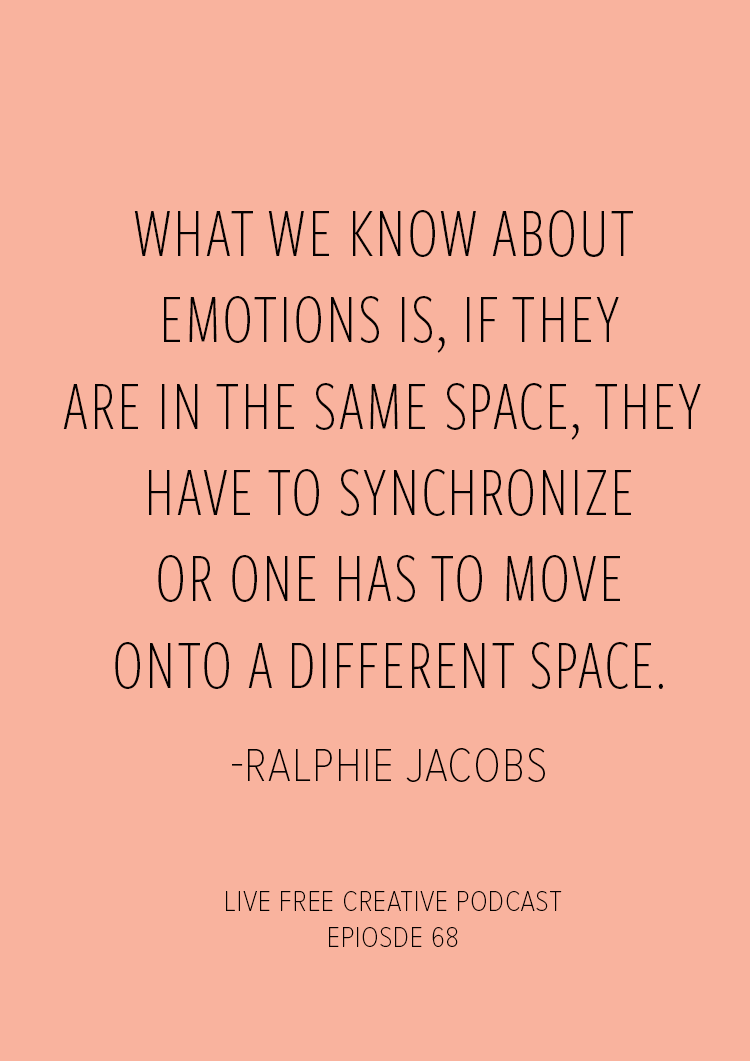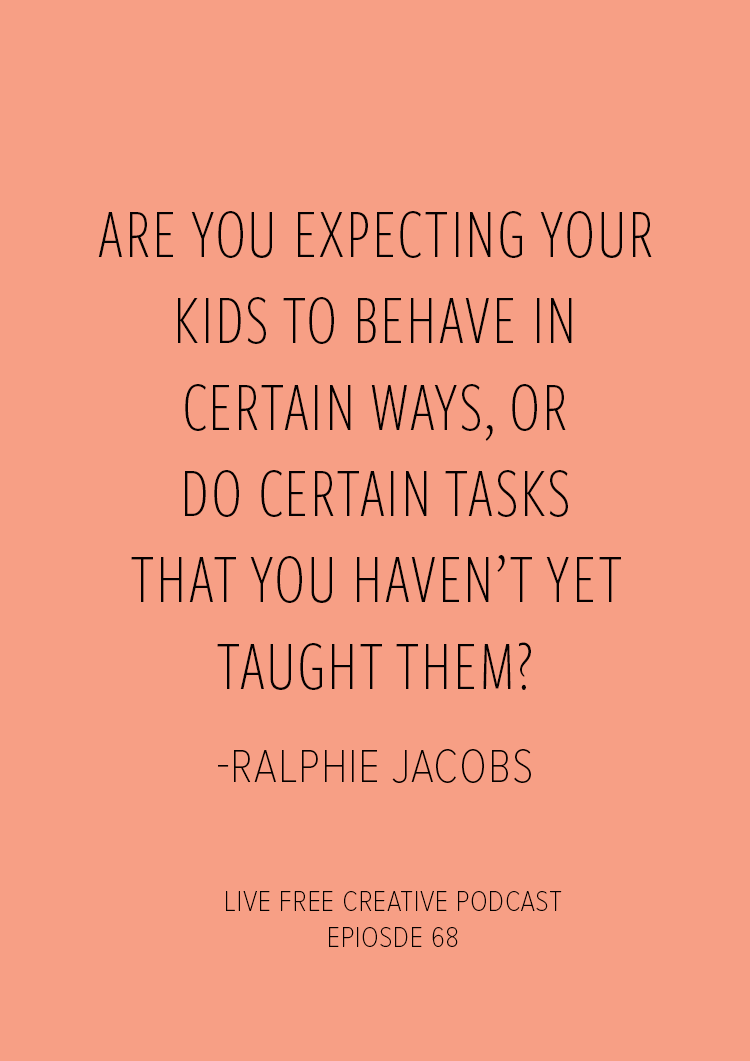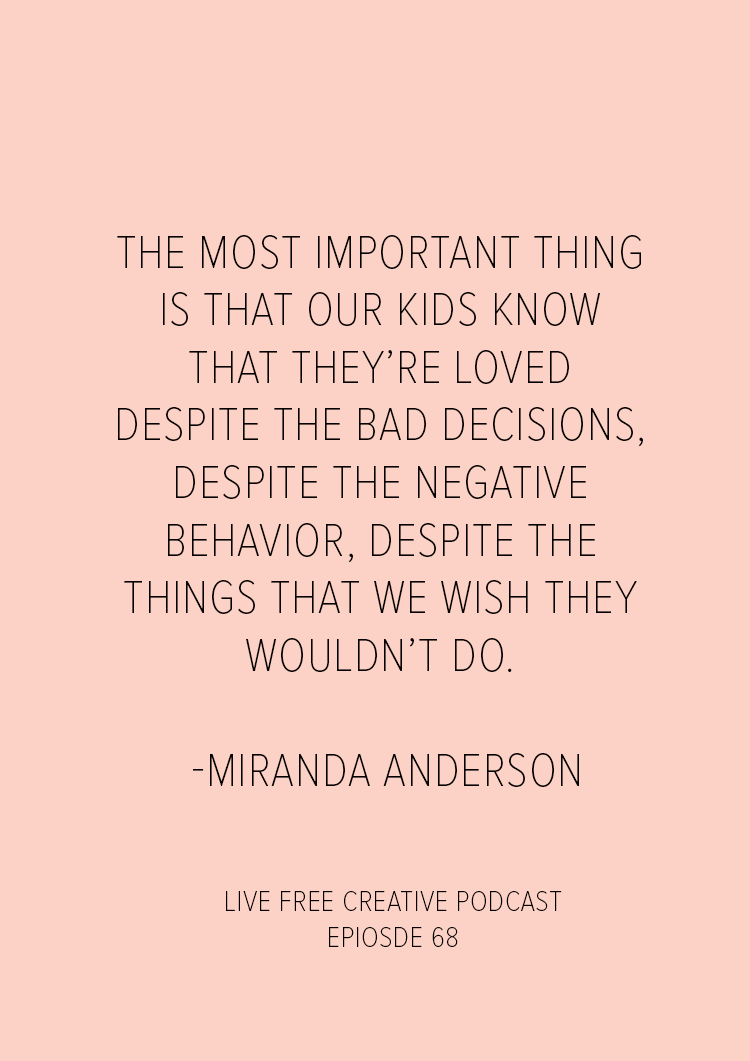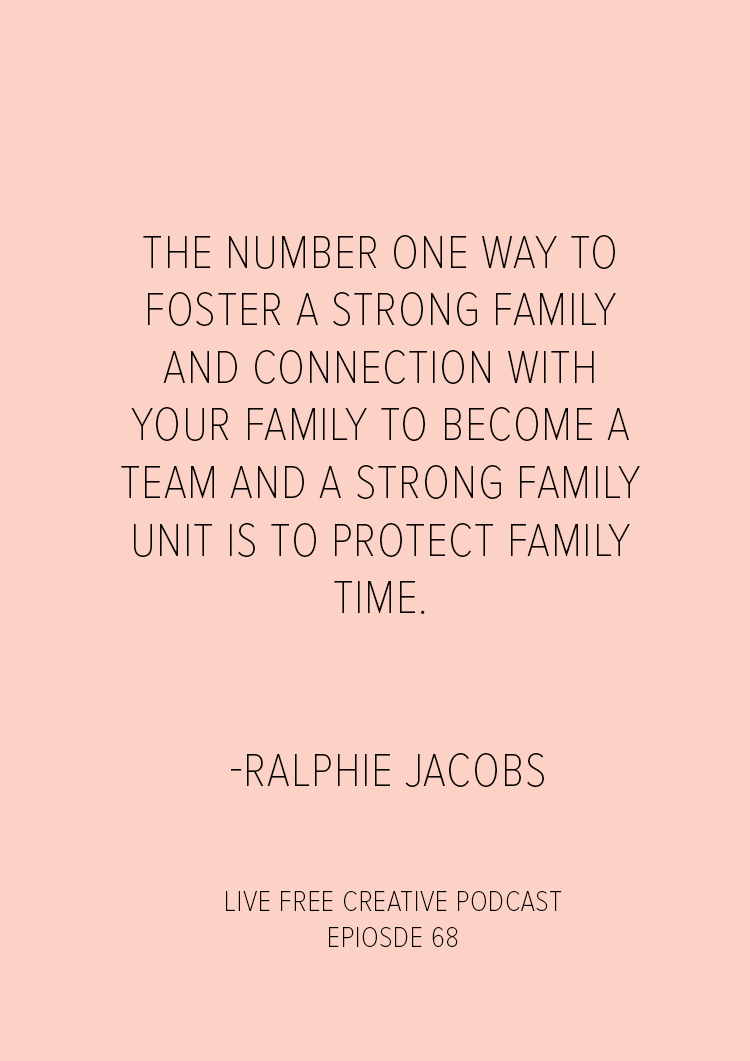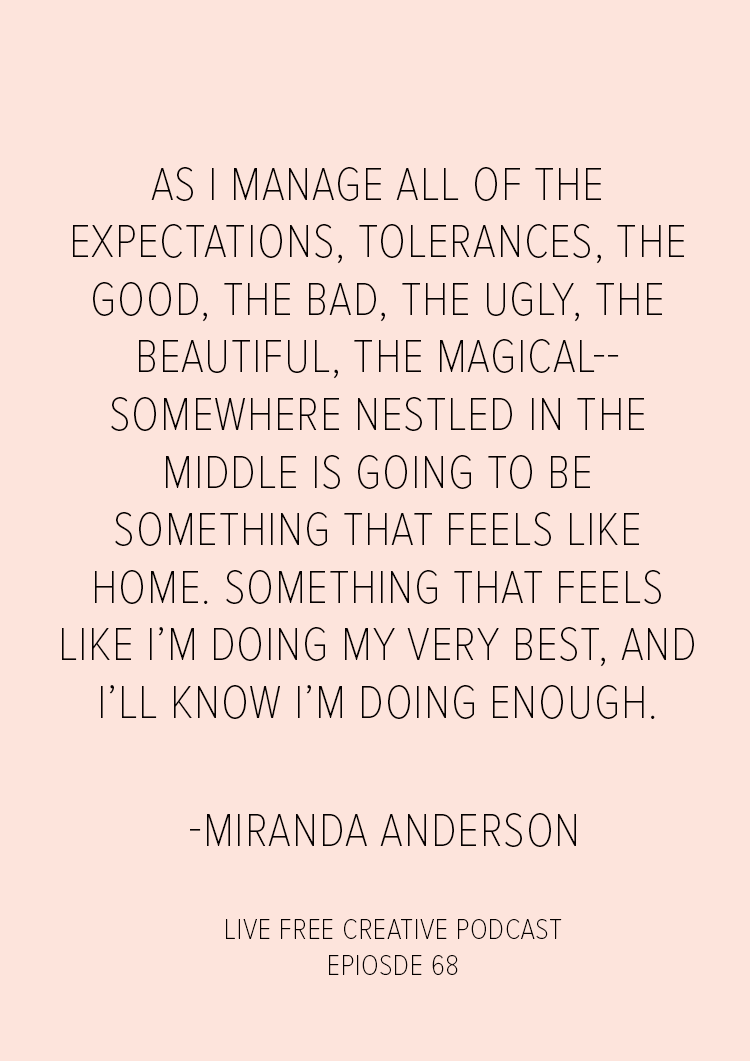
Episode 68: Parenting On Purpose
Welcome to Live Free Creative, the podcast that provides inspiration and ideas for living a creative, adventurous, and intentional lifestyle. I’m your host Miranda Anderson, and I hope that each time you listen you feel a little bit more free to live your life exactly the way you want to live it.
Introduction
Hello! Hello! Hello! Welcome back to the show. This is episode 68 of Live Free Creative: Parenting On Purpose with Ralphie Jacobs. Y’all, I have such a fun episode interview coming at you right now. Several weeks ago I was able to spend a weekend with Ralphie and I share, you know, we get into our conversation, but I couldn’t let the weekend go by.
I was sitting recording audio for her and I said, “We have to do a podcast episode. I don’t do a lot of interviews, but I want to do one with you sitting here right now!” and it’s so good. It’s so good. I think that it should be required listening, so listen to the episode. Share with all your friends, all your your parent friends, especially people with young kids, people with middle kids, people with older kids. Share this episode with people who want to feel like they’re doing a good job as a parent and they’re not really sure how.
Share this episode with people who want to feel like they’re doing a good job as a parent, and they aren’t sure how.
The things that we talk about in this episode are how, and I hope that you feel that I have felt empowered, more empowered as a mom since this conversation and since this weekend one-on-one with Ralphie.
My intent with recording this show was to bring some of that good energy, that good parenthood juju, and also really, even if you’re not a parent, this is, we’re talking about intention, we’re talking about expectations, we’re talking about managing yourself and your own emotions, and that goes way beyond parenting. That goes into lifestyle. It goes into work. It goes into relationships, friendships. The principles that we discuss in this meaty, wonderful upcoming episode are things that will help you regardless of your situation or circumstance in your life. I hope that you love it. So rather than doing a regular segment, I’m just going to go ahead and set the scene.
Setting the scene:
We are sitting in a small living room of a darling Airbnb situated right in the Mueller area of Austin, Texas. Now you know that I love Austin. I had had Torchy’s for dinner the night before. We had gone to C’ilantro and gotten the spicy kimchi fries for lunch. We’re just feeling all of the good Austin vibes and enjoying spending time together.
Get $40 off your first stay with Airbnb HERE
(This Airbnb, by the way, is one of my favorites. I’ve stayed in and I will put a link for it in the show notes along with a $40 off your first Airbnb code. If you have never stayed in an Airbnb and you’re interested in traveling and seeing the cities that you live in from the perspective of someone who actually lives there rather than from a hotel, Airbnb is the way to do that. I absolutely love it. And so I’ll share that code and this particular link in the show notes that live free creative.co/podcast.)
So we’re sitting there nestled up. We’ve just finished hours and hours of recording for Ralphie’s audio course, which we talk more about in the episode. And I have been a fan, a friend and a follower of Ralphie for a long time and there was something about the incredible simplicity of the principles that she shared that just was so inspiring.
I ask her the questions that I have been wanting to ask her about parenthood, about her methods, about her mindset, and she was so candid, so open and so generous with her responses. If you’re unfamiliar with Ralphie, she runs the Instagram account @simplyonpurpose where she shares intentional positive parenting tips on a regular basis. She also hosts in-person parenting workshops all over the country and you can find all of that at her website that I will link in the show notes and she also has these audio courses available right now for you to listen to at your leisure and feel even more empowered as a parent or a person.
I want to remind you before we dig into the episode that the entire transcript of every show is available on my website, livefreecreative.co/podcast you can simply scroll to the episode number that you are looking for and find the entire transcript organized so that you’re able to quickly access quotes, ideas, and reflect back on the things that you heard that you need to just read to soak in and have it resonate even deeper with you. So make sure that you take advantage of those show notes in whatever way you would like. And now that I’ve got that housekeeping out of the way, sit back, enjoy and pay attention because these are things that you’re going to want to know.
Interview with Ralphie Jacobs of Simply On Purpose
M: Okay, we’re here. Hi Ralphie, how are you?
R: I’m great, Miranda, how are you?
M: I’m good! Friends. We have been sitting in this really cute Airbnb in downtown Austin for the last several hours, recording lesson after lesson for this incredible new audio course that Ralphie has coming out like now. It has been so fun to be on this side of the computer listening to you, share all of your wisdom and I can’t wait for people to have it in their ears and be able to really just absorb all of these great parenting principles. But for those of my listeners who aren’t as familiar with you and what you do, I would love for you to just give a little introduction about you and your family and how you have come into where you are. Being an online and in-person parenting expert.
R: I tripped and fell face first into it. Hey, that’s a good thing to volunteer, right? Oh, I know. I love it so much.
So hello everybody. I am Ralphie Jacobs and I have the Instagram feed called @simplyonpurpose and I use that to teach parents how to live a purposeful life with their families and especially with their children. I grew up in a large family and I have a mother with a PhD in child psychology, so I’ve always loved children and I’ve been involved with children my whole life. That’s my real passion is to teach children, but I quickly learned that the way to truly impact their lives longterm for good is to teach parents. And so that’s what I’ve begun doing now is I teach parents and I really do love it because you can see the changes so much more quickly. It’s been an honor to be a part of it. Really.
M: Yeah. That’s so awesome. So your Instagram feed is really phenomenal because it is so instructional.
You share highlight videos. All of your content is really directed, like you said, at parents, to teach them how to be intentional with their parenting. I talk a lot about intentional living on my podcast. That’s really the focus of this show is to help the listeners make decisions to better live the life that they want to live, to kind of align this vision of where they’d like to be and who they’d like to be with the actions that they take every day.
And sometimes it’s tricky. I think the hardest thing about being purposeful in our decision making is maybe not knowing what the right decision is. So I’m curious, what is your most frequently asked question or your top couple frequently asked questions. I’m sure with the platform that you have that you’re getting lots of questions from lots of frustrated or disappointed parents, what do you think are some of the top questions and how do you answer them?
What are the most frequent questions you get from parents?
R: They’re usually questions about the parent and being in control of their own behavior so that they can help their child. That’s usually what I hear. That’s like the biggest frustration. How to stay calm when my child is not calm, how do I be the model? What does that look like? How do I separate my story from their story? And I spent a lot of time teaching that and allowing parents to practice over and over again.
It’s really difficult thing. We were just talking about this before the podcast started, how it is a lifelong endeavor is to learn how to be in control of yourself. So we’ve all been there and I have a lot of empathy for parents that struggle with it because I’ve been there too. So one of the biggest things that I teach parents how to be more in control is to identify their child’s story and to start to think like the child is thinking rather than using their adult brain.
Try to see things through a child’s perspective and then to also learn that even though a child is little and has a smaller body, they’re not a different, that we’re still very much the same and that we’re dealing with the same emotions that our children are dealing with. But just in a bigger way. So let me give you an example.
The child who is crying and is frustrated because they can’t tie their shoes, that is a behavior that we perform as well. We get really frustrated when things don’t go the way that we want them to. If we buy the wrong color of lipstick or the shoes that we bought aren’t fitting the right way. I feel like there’s like hundreds of examples of people’s lives and when things go wrong that you don’t expect or that you always right, that is life. Like we always have things that go wrong, but for some reason we want to project onto our children a better self than we are and that’s not fair.
They are still growing up, their brains are developing, they’re just little and we need to practice patience and have more compassion because we’re the same way. So that’s what I teach is I really try to teach parents how to change from a negative trigger to a positive trigger. What that sounds like for them to just start to think through their thought pattern before they react so that their interactions with their children can be much more intentional.
M: Yeah. I love this idea of recognizing that you’re separate from your child and that their behavior doesn’t have to impact the way that you feel. And maybe some people think, well, “I’m their parent. Of course I’m supposed to feel deeply whatever they’re feeling I’m supposed to like be involved at all times.” But what you’re saying is that actually if you can separate yourself enough to be in control of yourself and to maybe create some space from what they’re experiencing and then see it with your adult brain you know, hopefully more emotionally mature perspective that then you respond instead of automatically sort of reacting in the way that your instinct would tell you.
So do you have any specific like practices for this? Obviously this is something people have to practice because if what you’re doing right now is reacting every time your child does something wrong or that your children are fighting or you know all day long, all the things that happen that trigger you, that is difficult, I’m sure. What would you suggest people do to start creating that space or to start recognizing that they can be in control of themselves?
What would you suggest people do to start creating space to be in control of themselves?
R: Yeah. There’s this amazing concept called “holding space” and I absolutely love it. It basically means that all emotions vibrate at a a frequency. Emotions that are high, are bubbly, joyful, funny, fun, are at a higher frequency and emotions that are sad or angry or depressed or at a lower frequency. And what we know about emotions is that if they in the same space, they have to synchronize or the emotion has to leave, has to move onto a different space.
So think about this in your life. If you have friends that are like bubbly and joyful, what happens? You synchronize to their emotion?
M: The life of the party!Like that’s why people say that, right? Make sure we invite her because then everyone’s going to have a good time.
R: Yeah, yeah. Right. We bubble up to their same frequency of their emotion. And the say it’s the same with our friends that are always complaining or you know, the glass is half empty all the time. When you get with them, you’re like, yeah, you’re right. Life is the worst and I’m the worst and we’re all the way. Like it’s never, it’s never gonna be any better.
So let’s translate that to parenting. When you go into a room and there is chaos happening, but you’re like, “Oh, today’s great, and I just made the most delicious pumpkin bread”, or whatever it is.
M: And then you go in there you are definitely singing.
R: And I am always singing when I go into a room, when you go in there and there’s mess and chaos and this kid just kicked that other kid and said, you’re stupid, you’re dumb, or whatever, what’s going to happen? You either have to synchronize to their emotion or they have to synchronized to yours.
And most often we synchronize to the negative emotion. So the concept of holding space is basically that you hold your emotion for your child and you create space for the child to come synchronize to your calm and peaceful emotion. So hold your emotion. If it’s a calm emotion, yeah, hold it.
M: So the trick then is to learn how to create this calm emotion within ourselves so that it’s there in order to create space around it, kind of conform a buffer against all of those higher frequency, you know, negative emotions that happened with children’s misbehavior. Do you have any suggestions for maintaining the calm?
How do we maintain our own calm emotions?
R: Well, one of the biggest struggles I believe for me and for most parents because of the feedback that I get, is just basically that they expect their children to behave better. And here’s the reality about kids: they create a lot of junk while they’re going through their developmental stages.
It’s very, very appropriate and normal for a child to be surly to have tantrums, to throw fits to wine, to tattletale. It’s all part of their brains developing and growing. And what we get frustrated with is not actually our child’s behavior, it’s our expectations. What we thought was supposed to happen.
And this is the same with like any age. I mean the same with me and my husband, right? If I walk in, I expect the dishes to be done, which by the way, thank you Brian. He always does the dishes. But if I go in there and I’m like, Oh, this is going to be done again, I’m walking into a room and they’re not done. So frustrating.
So that’s what happens with expectations, they are actually kind of a stinker. So what I say is to look at your expectations. Don’t look at the child’s behavior, look at what you expect them to do. There’s this middle man in there and that’s the expectation. So if they’re not meeting it, is your expectation age appropriate and is it something that you’ve taught the child deliberately what to do so they actually know how to perform. That also is, it’s less of a, Oh, you’re being a kid. Bad kid. Oops, my bad. I need to be a better teacher.
How do we know what expectations are realistic?
M: Yeah, that is so interesting. So if we can recognize our expectation and then analyze, is our expectation age-appropriate? And if we don’t know that, I guess we could start doing some research and looking at what is the age appropriate for this age. I remember distinctly in college, I was in a child psychology class. I was a nursing major, so I took all of these science classes in psychology classes and I remember the professor, he had like eight children. But he talked about how specifically parents expect two year olds to sit still during an hour at church. And he said, this is, yeah, he said, this is insane. I don’t think you said this is insane. That would have been inappropriate for its psychology.
R: Probably because he has dealt with a lot of insanity.
M: Yeah, he is the expert! Haha. But. that a two year old will sit still for longer than a few minutes at a time quietly is, is that’s developmentally inappropriate. But how many of us when we had two year olds, I mean some of, I mean a lot of my listeners probably don’t have kids yet or have two year olds now or are on the path. You know, I remember thinking distinctly that my two year old should be able to sit longer than he or she did because it’s like they’re kind of, they’re babies but they’re not babies anymore. And so you start to project these adult behaviors onto them. Why can’t you sit still? Or why can’t you be quiet? Or why can’t you, you know, put things away. And, and so I love the idea of analyzing and being sure that your age appropriate expectations are intact, that you’re making those, you know, ideas there.
You’re not pulling them out of your own head because unless you are yourself, a child developmental specialist, then you probably don’t know. And that’s okay. Inform yourself and learn what are some age appropriate expectations.
And then the other one, this idea of are you expecting your kids to do things or behave in certain ways that you haven’t yet taught them? And this, I feel like that’s such a light bulb moment because kids have to learn how to do everything. They come, I mean with a blank slate, they’re a blank slate and think sometimes we forget. And all of our keeping them fed, keeping them, you know, hopefully kind of safe, um, making sure they’re dressed and coordinating outfits and you know, all the things that we do to manage them as, as, as children. Sometimes we forget to just simply teach them behaviors, regular behaviors maybe because children do absorb so much of their environment and they see us do things. Modeling, they’ll model it. Sometimes the stuff that they’re modeling, you don’t even want them to learn.
R: Right. So that’s why it’s so important to just remember that I am the teacher, I am the model and make a difference between can’t and won’t. Are they not doing it because they’re trying to make your life miserable and this is a terrible twist of fate or is it because they can’t, like you said with a two year old, maybe they can’t and you’re asking them to do it?
M: Right. And then at that point, how much easier is it to feel peaceful when you understand that the expectation was wrong? Then you form a new expectation, this is the hope, right? That you then are able to adjust your expectation to a correct scenario so then you can hold that space. You can be a calm presence because you know that kids yell, kids make messes. Kids don’t pick up their socks every time that you ask. And a lot of kids don’t eat their dinner and all of the other behaviors that we feel so frustrated about all the time.
But I think it’s also so interesting that we are all frustrated about it all together. Like all chanting the same like, “Oh, save me from the mess and save me from the noise and save me from the arguing. And we’re like, if we took a second and looked around and realize that this is Parenthood! This is what if that is the chorus of Parenthood, it is and it, and it’s not a bad song.
R: It’s beautiful. Even in that mess, there’s so much learning going on and I really do think that children raise parents. It’s like the other way around that they make me into a better, more beautiful soul than I could ever be without my kids. Even with all of our hiccups and potholes and hurdles and messy stuff around us that we become a stronger, better people because we have each other. Yeah.
M: It’s so true. That’s so beautiful. And to remember that. Yeah, I think that that is really important. Okay. So I love, I love where we’re going so far at this point.
And my gosh, my mind’s racing with like, I feel like I’ve been better about expectations, like releasing expectations generally knowing that my life, I mean I’ve had such insanity the last years of just so many things not going the way that I expected that I feel like a lot of times I’ve sort of released it all and I’m like, I have no idea. I have no idea if a ceiling will fall down today or not. That’s the last option, right? To be carefree, relinquish at all.
An important truth: perfect parenting doesn’t yield perfect kids.
And there’s something really beautiful in that. I’m going to give an example. Sometimes something that I love about your feed and your message is that you’re really candid while you’re, you know, so informed and so inspirational. You share stories about real life in your house with your four daughters that don’t always look ideal. And I think that sometimes we mistake the idea of being a positive, purposeful parent. We think that that will yield a completely peaceful, super well-behaved, tied with a bow home all the time. And that’s not what it looks like, is it?
R: No, it’s not ever, ever what it is. I was the same way. I thought that people who wrote parenting books or were speakers on parenting had beautiful, well-behaved, obedient little robots. But no, we actually have this wonderful gift of perspective. We have an understanding of what children are supposed to be doing and that is living their childhood and I’m grateful for that. Like that is probably the biggest gift through this journey that I’ve been given is to look and have compassion or laugh about something silly that they just did or say I, it’s okay that you don’t like that. That’s all right.
If you don’t want to eat that, you know, not a big deal. I’m not worried about it and you’re going to be fine no matter what because I love you. Yeah, this is a safe place for you. It’s going to be all right. And just teaching them in an environment that has low stakes, but lots of unconditional support. That’s all they need. Really.
Like my oldest is 16 and the biggest lesson that I’ve learned with her is that all I need to be is an emotional touchstone. I just need to be that place where she can keep coming back, touch me, let you know. No. All right. It’s going to be okay because mom’s here. It’s going to be all right and then go on her way. Yeah.
M: Yeah. Having learned good lessons and she’s going to make her own choices, but you’ve created this relationship where she knows that she can come to you, that you’re her safe space regardless of what she’s choosing for her own life. You, you know, you have your hopes and dreams for her, but you also allow her to have her own hopes and dreams and to be this unique entity that I allow that to happen sometimes.
R: What is difficult for me is to remember that she’s not supposed to be good at the same things that I’m good at and that her weaknesses look different from mine. And also children are not supposed to be perfect all the time. And that our job as parents is to be okay with their imperfection. That parenting is not about having children who behave well all the time. It’s just about being a safe place for them when they do make mistakes.
M: Yeah, I love that so much. It’s so interesting to just step back with this perspective that you talked about and recognize that we are acutely aware of our own imperfections, that we make mistakes sometimes on purpose and sometimes not on purpose. That we make choices sometimes that are good and sometimes that are not so good and because we’re adult, there’s not a whole lot of negative feedback that comes our way because we are the adult.
Simply On Purpose in a Nutshell
But then we expect that our kids behave the exact way that we think that they should all the time, rather than allowing them to, you know, teaching them appropriate behavior, but recognizing that they’re just like us. They’re going to make mistakes too. They’re going to have, they’re going to make good decisions and bad decisions and I love that you talk about being that safe space for them. That in our homes where we’re raising our children, the most important thing is that they know that they’re loved despite the bad decisions, despite the negative behavior, despite the things that we wish they wouldn’t do. Sometimes that’s part of who they are. It’s part of being a child. It’s part of learning and regardless of all of that, they always know that they’re safe and that they’re loved and that it’s okay. Yeah. That’s so good. It’s so beautiful.
R: It’s like you just like summed up Simply On Purpose in a nutshell. Let’s put a bow on that and just like send it off to everybody.
M: It’s so much easier said than done though.
R: Oh gosh, everyone wants like, I think that we want, that is the ideal. That is the ideal. But we make mistakes. All that. Like you were just saying, I mean like they’re like, you know, just two minutes ago I’m like, Oh my word, I need to be more calm and that wasn’t a big deal. Why was I upset about that? Come on Ralphie, you know, put it, pull it together.
But repairing is a part of life too and saying, I’m sorry, and looking back and saying, Oh, what could I do better? That’s something that I really encourage parents to do is to not sink into that swamp of like self pity and self-loathing and just kind of stay there. I want you to swim to the other side and get to the shore and move on and move forward and learn from whatever it is that you need to learn from. Realize that there’s a lesson there. What is it? I’m going to learn from it. Let’s practice it again. Here we go. Five, four, three, two, one or whatever.
M: Yeah, I love that. Well, it’s such an important model for our children that you make mistakes and that you can repair and move on and ask forgiveness. Say you’re sorry. This is something I feel like as a a parent came a little bit later to me. I mean later, like my kid, my oldest is probably three or four when I had a light bulb moment one day after, I’m sure being upset with him about him doing something that was likely totally age appropriate, that I just expected him to do something different.
And I had gotten mad at him and he was sad and I was still mad and I was in the other room feeling mad, feeling frustrated and feeling disappointed in myself for feeling that and feeling frustrated. And my temptation was to go back and just kind of pick up where we left off, like pretend like it hadn’t happened and kind of moved on to make yourself feel better and myself feel better.
Like, okay, now let’s go do something else or you know, and I realized that it would be healing for me and for him, for me to apologize because I had made a mistake and I knew that he was going to make mistakes too. And it would be important for him to see the process of healing from a mistake instead of assuming that you made a mistake and ever makes mistakes, but then you just move on from it.
And so I consciously decided that apologizing to my kids and letting like working through that process with them and telling them, I don’t know everything. Like I’m really, I’m sorry I shouldn’t have behaved that way. I shouldn’t have yelled at you or whatever and I want to do better and I love you and I want like, let’s work on this together. And when I start to get mad, if I, you know, if I start to use my loud voice, could you remind me sometimes like, can we work on this together? And if I use my soft voice, could you use your soft voice too? And kind of bringing it into a little bit of teamwork and like a partnership, like you were saying, they teach us probably more than we teach them. And it’s necessary to, to have both perspectives that we’re here to serve as guides for them and to hold that space and love for them. And we also can be learning continually and openly learning. We don’t have to have our children think that we’re perfect.
You are your child’s North Star
R: Yeah. Yeah. We really are the gold standard for everything with our kids. That doesn’t mean that we have to be the perfect gold standard, but we should be this gold standard that apologizes and shows how that looks and what that and the process between forgiving and moving on. I love that idea. Like even the gold standard for making mistakes, right? Yeah. They look to us for everything. We’re really their North star for all things. And it is important for your children to see that you’re a human, that you’ve been human, you’re humanized and they’ll have compassion for you because you share it with them, your humanness.
M: Yeah. And then the family love just continues. They can love you. And have realistic expectations for your parenting, just the way that you love them and have relaxed, realistic expectations for their childhood and I feel like that’s a really healthy relationship. Then when you’re able to see each other for for the wonderful imperfect but filled with potential and light and love humans that we are.
I want to change gears just for a second. I feel like we have so many great nuggets already and I am so excited for everyone to learn from you on Instagram and also to learn from you at one of your in person workshops if they get a chance. All of that information is always on Instagram and then also these audio courses that are coming out have such good tips and information and I can’t wait. It’s been an honor to be a part of it and I can’t wait for everyone to sign up.
What do you do to foster family connection?
I just want to ask one more kind of lighthearted question. I really admire the way that your family is so connected and I know that that’s intentional. I know that that hasn’t just happened because you like each other a lot. If you are practicing regularly, ways that your family can stay together and stay connected and your daughter being, I mean she’s a full fledged teenager, like she’s, she is going to be on her own fairly soon.
R: I know!!
M: Did this remind you of that? But I thought you would be the perfect person to ask about some of your favorite ways to intentionally keep your family connected practices that you have at home that build community within your own family.
R: Mm. Well I would say the number one way to foster a strong family and connection with your family to become a team and a strong family unit is to protect family time. Because if you don’t protect it, then who will, who’s going to do it for your kids if not you?
M: What does that look like in your home? What types of regular family time do you have instituted?
R: Yeah, so family dinner is very much a sacred time for us. We try to make sure that we don’t have extracurricular things happening during family dinner. That’s not something that every family can do, but it’s been a huge priority to our home. And so we’ve tried very hard to make sure that happens. Another thing is that we have traditions, daily traditions or weekly traditions that protect that family time.
And one of them is having family meetings. Every Sunday we’ll have a family meeting where we talk about a value that we were working on or we plan together our weekly calendar so that we are having good, effective communication. We’ll maybe practice some behaviors that we see some kids struggling with prior.
M: That’s a really intentional time to teach your children.
R: So yeah, we love that time. We also really foster friendship between the, between the children. We help them to have a platform by which they can stand up and nominate each other for good things that they’ve seen each other do throughout the week. And what’s crazy about that is that like children will be fighting with each other 30 minutes before and then they’ll stand up and be like, Oh, nominate Aaron for being kind to everyone. Because I saw her the other day and I’m like, you guys are just fighting like a minute ago.
But, but if you just create like the some platform where they’re like, all right, we’re going to stand up or we’re going to see the good in each other, they’ll crazy. They’ll stand up and find something good about somebody else. So I, I love that. We have this tradition where Brian comes home and he calls it the hug rug where children will run up and hug him when he’s, he comes home from work. They’re like, traditions are this fabric that keep our family together. You weave them together and they hold the family together. So I love traditions.
I’m a huge fan of like family movie night also like date night to protect that time with your husband because if you have a strong relationship with your spouse, then that trickles down to your children as well. It helps that family unit to stay together and to be healthy and strong. So there’s a lot of those different things that we do within our home.
We have systems that kind of run in the background. So that I don’t have to be yelling at my kids all the time to like clean up their messes or to do this or to that to do that. They already know what’s expected of them and we have those kinds of running so that I’m not in the background but it’s called like the Family Economy and if your audience wants to learn more about it, there’s a email that they can sign up for in my link tree that like gives them all the info about that. Lots of info about how to make that happen and some of these things won’t work for every family and that’s like the purpose of my feet is to not say you have to do all of these things.
Part of being a content creator is that I’m creating lots of content that’s like this is a good idea and this is a good idea and this is a good idea. Use the ones that work great for you. I just want you to be inspired to hold that unit together because the foundation of our society is the family. Like, we really want the family to be strong and that’s basically my work is to help strengthen families.
M: Yeah, I love that so much. Okay. It sounds like there are so many fantastic ideas, both that Ralphie has given us in this episode and also she shares these ideas and ideas like them regularly on her Instagram and through her workshops. So thank you so much your time after a really long day.
Let me keep the mic on and I’ll just record it because your voice is one of, it’s like this clarion call in a world with so many messages that are distracting us from the things that matter most. And it’s so wonderful to know that every time I turn on your feed or I listen to something that you’ve created, that it will remind me what I really want to be focused on. And that’s creating meaningful within the walls of my own home.
My family is what is going to be consistent throughout all of the ups and downs and changes of my life. And that is where the most important work that we do will happen. So thank you so much for everything that you contribute to that. And thank you for giving me some of your time today.
R: I love you Miranda. No problem. Anytime.
M: I love you too. Okay, well I’m make sure that in the show notes you can find links to Ralphie’s Instagram. You can find links to her workshops and absolutely check out her new audio courses. They are available now and you can buy them and listen to them over and over and over again. I know you are audio people because we’re in your ear right now. So this could be the very most accessible way for you to get more information and more lessons about how to be a more purposeful parent.
Wow, right?
So many good nuggets. I have to tell you, I’ve been thinking about this interview for weeks and weeks and two of my very favorite takeaways, things that are stuck with me that will never leave me, that they cannot now that they’re here:
Number one, that parenting is about me controlling myself as a parent. And really being that safe space for my children regardless of their actions, knows that they can come and that they can work it out.
Number two that even if I am an incredible parent, if I’m fully in control and fully peaceful and fully loving and teach really well and model really well, that even then my children are not going to react perfectly. That they are in a constant state of learning, growing and experimenting and that is to be expected. So my tolerance level for things that I might not prefer needs to go up and my understanding needs to go up and my expectation that things are always going to be quiet, clean and tidy needs to go down to a realistic level.
And as I manage all of those expectations, tolerances, the good, the bad, the ugly, the beautiful, the magical that somewhere nestled in the middle is going to be something that feels like home that feels like I’m doing my very best and I’m doing enough. And by gosh, my kids are doing their very best as well, that they are showing up in the best way that they can right now assuming their nobility, assuming their willingness to learn and to change and to grow as I provide an environment that is conducive to that progress and the final thing, something that we all need to hear those of us with kids and without is that we’re doing a really good job.
You, you’re doing a really good job. There’s always going to be things that we can improve, but for for right now, just take a moment and acknowledge how far you’ve come.
That’s the show for today, my friends, episode 68 I hope that you’ve enjoyed it.
If you have remember to share it, take a screenshot, share it on social media. If you’re not already subscribed to the podcast, there are new episodes every single Thursday morning at 6:00 AM Eastern. Make sure you don’t miss a one by becoming part of our subscribed community. If you love the show and you would like even more head to patreon.com/livefreecreative and become a podcast plus member where you get a bonus episode with a worksheet every single month.
And if you love the idea of parenting on purpose and you think you could expand it to your whole life, living your life on purpose with intention, make sure you check out my book More Than Enough: How One Family Cultivated A More Abundant Life Through A Year Of Practical Minimalism. Available right now in the show notes and also on Amazon or at shop.livefreecreative.co.
Talk to you next week. Bye bye.

